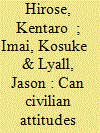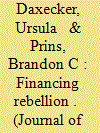| Srl | Item |
| 1 |
ID:
151115


|
|
|
|
|
| Summary/Abstract |
Are civilian attitudes a useful predictor of patterns of violence in civil wars? A prominent debate has emerged among scholars and practitioners about the importance of winning civilian ‘hearts and minds’ for influencing their wartime behavior. We argue that such efforts may have a dark side: insurgents can use pro-counterinsurgent attitudes as cues to select their targets and tactics. We conduct an original survey experiment in 204 Afghan villages and establish a positive association between pro-International Security Assistance Force attitudes and future Taliban attacks. We extend our analysis to 14,606 non-surveyed villages and demonstrate that our measure of civilian attitudes improves out-of-sample predictive performance by 20–30% over a standard forecasting model. The results are especially strong for Taliban attacks with improvised explosive devices. These improvements in predictive power remain even after adjusting for possible confounders, including past violence, military bases, and development aid.
|
|
|
|
|
|
|
|
|
|
|
|
|
|
|
|
| 2 |
ID:
152299


|
|
|
|
|
| Summary/Abstract |
A prominent explanation of the resource–conflict relationship suggests that natural resources finance rebellion by permitting rebel leaders the opportunity to purchase weapons, fighters, and local support. The bunkering of oil in the Niger Delta by quasi-criminal syndicates is an example of how the black-market selling of stolen oil may help finance anti-state groups. More systematic assessments have also shown that the risk and duration of conflict increases in the proximity of oil and diamond deposits. Yet despite the emphasis on rebel resource extraction in these arguments, empirical assessments rely almost exclusively on latent resource availability rather than actual resource extraction. Focusing on maritime piracy, this article argues that piracy is a funding strategy neglected in current research. Anecdotal evidence connects piracy in the Greater Gulf of Aden to arms trafficking, the drug trade, and human slavery. The revenue from attacks may find its way to Al-Shabaab. In Nigeria, increasing attacks against oil transports may signal an effort by insurgents to use the profits from piracy as an additional revenue stream to fund their campaign against the Nigerian government. The article hypothesizes that piracy incidents, that is, actual acts of looting, increase the intensity of civil conflict. Using inferential statistics and predictive assessments, our evidence from conflicts in coastal African and Southeast Asian states from 1993 to 2010 shows that maritime piracy increases conflict intensity, and that the inclusion of dynamic factors helps improve the predictive performance of empirical models of conflict events in in-sample and out-of-sample forecasts.
|
|
|
|
|
|
|
|
|
|
|
|
|
|
|
|